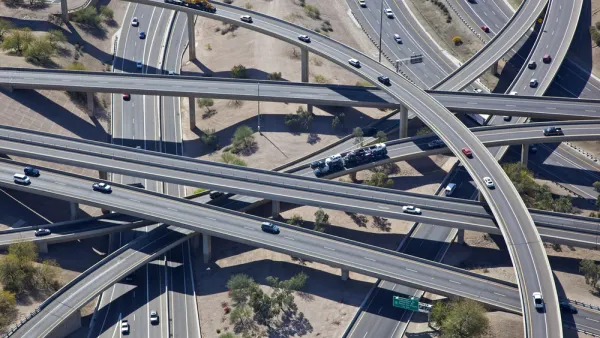A new analysis form the Pew Charitable Trusts showed a 20 percent reduction in state spending on transportation between 2002 and 2011, compared to a 4 percent drop from the federal government over the same period.
As written in Governing by Daniel Vock, a recent analysis on transportation funding throughout the last decade by the Pew Charitable Trusts illuminated the shifts in federal and state spending. While federal funding usually receives the brunt of criticism as an unreliable partner for funding, in fact, states are also to blame in their drop of transportation spending over the last decade.
As the report discusses, between 2007 and 2011, "average annual spending on highway and transit nationwide was $207 billion. Of that total, $82 billion, or 40 percent, came from states; $74 billion, or 36 percent, from localities; and $51 billion, or 25 percent, from the federal government."
According to the Vock, the federal government's average spending figures "are higher in part because it was still spending some $13 billion in stimulus money on transportation in 2011. Without the money from the recovery package, federal spending would have dropped by 25 percent between 2002 and 2011. The biggest reason for the spending drop at both levels was a decrease in buying power from fuel taxes."
The federal government relies on this fuel tax for maintaining and funding most of the country's transportation infrastructure, but expenditures have been outpacing revenues for the last decade. As Vock writes, "states are only in a slightly better position. They rely on vehicle taxes for a fifth of their road funding, but those revenues, too, have been falling. Pew suggested that declining vehicle ownership may be one reason those taxes dropped by $8 billion, or 21 percent, in the decade leading up to 2012."
Coupled with the decline in fuel tax revenues, "the cost of road construction increased by 60 percent between 2002 and 2012, meaning the dollars states and the federal government collected did not stretch as far."
FULL STORY: States Are Actually Driving Transportation Funding Declines

Analysis: Cybertruck Fatality Rate Far Exceeds That of Ford Pinto
The Tesla Cybertruck was recalled seven times last year.

National Parks Layoffs Will Cause Communities to Lose Billions
Thousands of essential park workers were laid off this week, just before the busy spring break season.

Retro-silient?: America’s First “Eco-burb,” The Woodlands Turns 50
A master-planned community north of Houston offers lessons on green infrastructure and resilient design, but falls short of its founder’s lofty affordability and walkability goals.

Test News Post 1
This is a summary

Analysis: Cybertruck Fatality Rate Far Exceeds That of Ford Pinto
The Tesla Cybertruck was recalled seven times last year.

Test News Headline 46
Test for the image on the front page.
Urban Design for Planners 1: Software Tools
This six-course series explores essential urban design concepts using open source software and equips planners with the tools they need to participate fully in the urban design process.
Planning for Universal Design
Learn the tools for implementing Universal Design in planning regulations.
EMC Planning Group, Inc.
Planetizen
Planetizen
Mpact (formerly Rail~Volution)
Great Falls Development Authority, Inc.
HUDs Office of Policy Development and Research
NYU Wagner Graduate School of Public Service



























